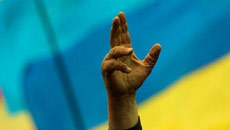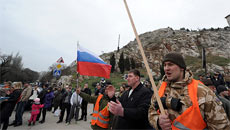NEW YORK - Canada is now weighing the possibility of an extended military role in the Middle East and will be making an announcement on the matter very soon, Prime Minister Stephen Harper indicated Wednesday.
Harper said he has just received a request from the U.S. government in the past several days for further Canadian involvement in the fight against Islamist rebels. At a public appearance in the U.S. on Wednesday, the prime minister expressed general support for the American-led mission, while adding that he's not yet ready to announce Canada's next move.
"We need to have some additional debate in our government before we reach a final decision," he said during a question-and-answer session in New York before an audience of U.S. business leaders, explaining that he wanted to discuss the issue both in cabinet and Parliament.
As for a timeline, he added: "The Government of Canada will make a decision on that very, very shortly."
Harper declined to offer any details about a possible new engagement, when pressed. He said the U.S. government didn't make its "letter public," and he wasn't going to do it there.
One government official familiar with that request later explained that it did not involve combat. The government has been under pressure in Parliament to clarify its intentions beyond the 30-day commitment it's made to assisting the fight against the Islamic State of Iraq and the Levant.
Harper outlined for his audience what Canada has done over that period.
He declared with a smile that Canada's military has actually moved more supplies into northern Iraq, so far, than the United States Air Force. In addition to those logistical flights, he said Canada had the second-largest contingent of foreign forces advising the Iraqi military.
Harper said the world can't allow terrorists to gain safe havens like the one that has developed in eastern Syria and western Iraq. Later in the day, he made the same point when he joined other leaders in speaking to the UN Security Council, and expressed support for a resolution to clamp down on foreign fighters.
Earlier in the day, U.S. President Barack Obama had urged world leaders in a speech to join his expanding military campaign to stamp out ISIL's "network of death."
"There can be no reasoning, no negotiation, with this brand of evil," Obama told the UN General Assembly. He warned those who have joined their cause to "leave the battlefield while they can."
The U.S. request to Canada, one Canadian official said, has been part of a natural progression of events and came as no surprise to the government: "We've been working closely with the Americans, who have been trying to build a coalition for quite some time... We've been involved in those discussions," he said, adding that the Canadian government has always made it clear it "that it would be prepared to do more as requests came in."
Wednesday's public Q-and-A between Harper and the Wall Street Journal's editor-in-chief also delved into some of the sociological aspects of the fight against ISIL.
Some of the terrorists who carry Western passports can hardly be called Muslims — some of them apparently don't even attend mosque, Harper said. When invited to opine on whether George W. Bush's Iraq invasion caused the current mess, Harper cast his glance much farther back than 2003.
He said a major root of the current trouble is a Sunni-Shia rivalry that goes back centuries, and which has killed far more people than anti-Western terrorism. As for that hostility to the West, Harper suggested that's nothing new, either. He said there's been a constituency for that since the Crusades.
At that point the editor-in-chief, Gerard Baker, interjected: "Of course, they had a point during the Crusades."
That was just one snippet of a free-flowing conversation in New York's financial district, where the high-profile newspaperman pressed Harper on a number of fronts. Baker mentioned Canada's relatively strong economic performance, but he pushed Harper on the relative weakness of some Canadian economic sectors beyond energy, and on whether Canada's recent economic performance hadn't softened a bit.
During that conversation, Harper expressed his own ideological opposition to bulk data collection in fighting terrorism — which has caused so much controversy in the U.S., and to a lesser extent in Canada.
Harper said he disagreed with mass surveillance, not just on moral grounds but also on tactical ones. He suggested more targeted, crime-fighting techniques were generally more useful.
"I'm not a big believer in those kinds of systems. Not just because they have the potential to infringe civil liberties, but they usually overwhelm you with data in a way that you can't actually process or make any use of," he said.
"The real challenge, I think, is using these tools in a way that you focus in on the people who are actually going down the wrong path. Just as, frankly, we do with much of traditional crime. We try and focus on people we know who have become associated with criminal gangs or criminal activity, we don't focus on entire cities or entire populations from which they come."
Although Canada belongs to an intelligence-sharing partnership with the U.S., Harper said: "We don't do that in Canada. We don't use metadata as a surveillance tool... (But) we have broken up plots... and we have done that through targeted, on-the-ground surveillance."
At the end of the conversation, the editor of the conservative-leaning newspaper asked Harper what advice he might offer his ideological brethren in the U.S.. Some conservative commentators south of the border have lamented their losing streak in presidential elections and pointed to recent Canadian experience for possible lessons.
Harper's answer focused exclusively on immigration. In the U.S., the debate over illegal immigration has divided the Republican party, between a Wall Street wing that favours amnesty for illegal migrants against a party grassroots that is dead-set against it.
Harper replied that the biggest contributor to his own party's growing success was its outreach to immigrants, and he mentioned in particular the work of multiculturalism Jason Kenney. He said that personal contact helped Canada's Tories turn "small-c conservatives" — immigrants who agree with his party on crime, fiscal issues, and social issues — "into big-C conservatives" who actually vote for him.
"We began our appeal by showing up," he said, and described the eventual success in getting visible minorities elected as Conservatives and, increasingly, also voting Conservative.
"This is a huge transformation. It's why we've come to office, and have stayed in office."






